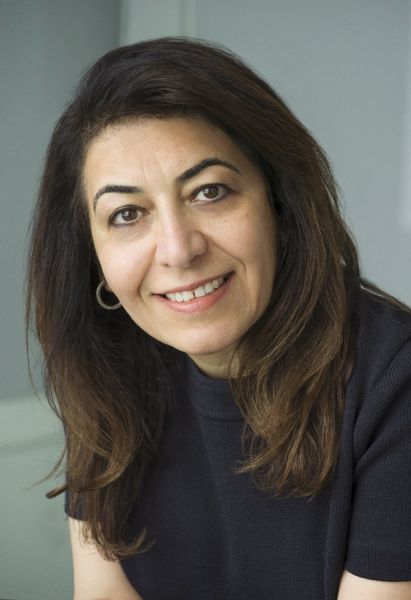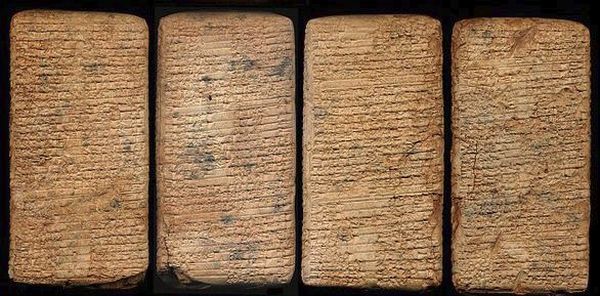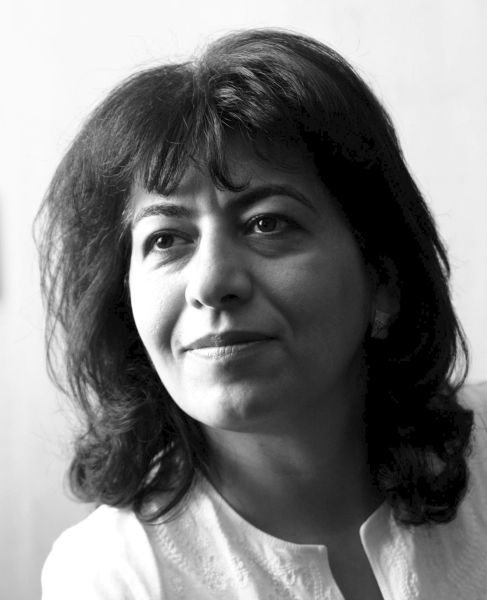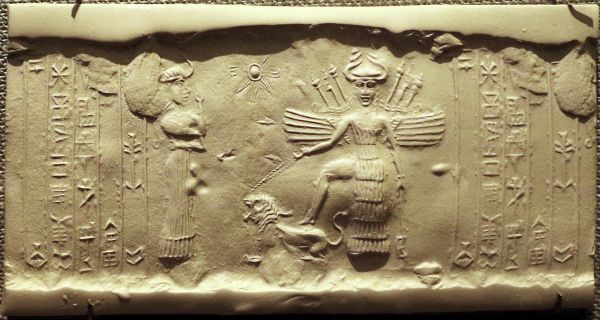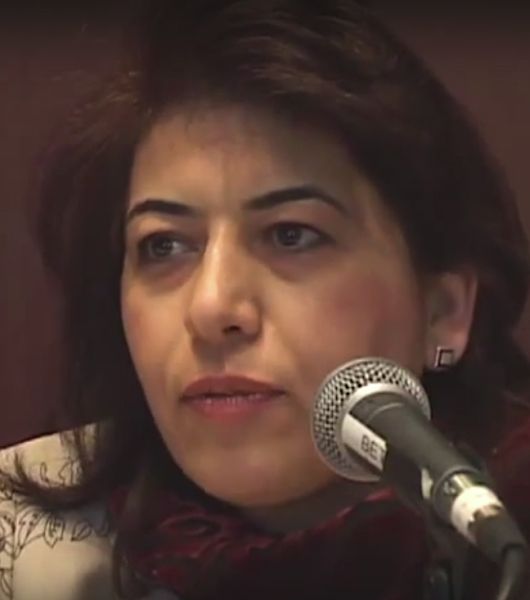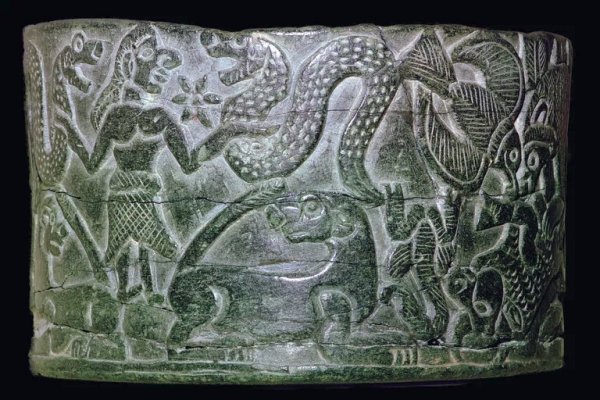Ilinca Bernea: It's hard to decide where to start from. I am tempted to say: from Uruk, but I'm afraid we won't get to finish in this life time. But I will still ask you: Have you seen the ruins of Uruk? And what you felt being there?
Dunya Mikhail: One time I visited it with my aunt in a field-trip with her co-workers. As a teenager, I didn't realize its importance. The site actually seemed such a boring place for the picnic. Later I learned about the epic of Gilgamesh and that writing happened there first in the history. When I was in Iraq, I didn't care that much about our ancient ruins, maybe because, due to the war, we witnessed enough ruins already in front of us, happening and growing with us.
I.B.: What I found the most appealing in your poetry is that it touches "hardcore" political matters without being political at all, it is entirely humanist and has a renaissance-charisma. It doesn't have the substrate of "engaged" art and not a glimpse of ideological commitment. It is at the same time essentialist and contemporary, ethereal and grounded in personal experiences. It has a mythological depth and metaphoric charge, it has a fairy-tale perfume and the vaporous air of the reveries, the fogs in which appear enveloped odysseys of the wondering soul. It eludes in a graceful way the contingent level. The reality depicted by your lyrics doesn't belong to a certain time, space or context.
Your poetry is the one of an ingenuous spirit and of a dreamer prisoner in a step-fate, caught in a labyrinth of sorrows, doubts, reviews, bitter reflections. What is obvious is that the horrors you've been witness to haven't affected your inner force and brightness. Your poetry expires hope and faith in love's strength and unshattered resources. How is to see the war and to keep believing in human goodness?
D.M.: The view of violence brings with it a view of kindness. With war comes the possibility for peace. That possibility is crucial for our humanity. The falling autumn leaves inform us of end but also of a new beginning. Poetry puts imagination into effect and diagnoses the moments of life in their truths. But poetry is not only a writing about an experience; it's itself an experience. In my touching of the soul, I seek poetry, and in my seeking, I am bewildered and enlightened.
I.B.: Can poetry bring peace? Does art have the power to change the evil bents or heal wounds? can it put a break to madness?
D.M.: Is it okay to insert this poem as an answer?
My Poem Will Not Save You
Remember the toddler lying face down
on the sand, and the waves gently receding
from his body as if a forgotten dream?
My poem will not turn him onto his back
and lift him up
to his feet
so he can run
into a familiar lap
like before.
I am sorry
my poem will not
block the shells
when they fall
onto a sleeping town,
will not stop the buildings
from collapsing
around their residents,
will not pick up the broken-leg flower
from under the shrapnel,
will not raise the dead.
My poem will not defuse
the bomb
in the public square.
It will soon explode
where the girl insists
that her father buy her gum.
My poem will not rush them
to leave the place
and ride the car
that will just miss the explosion.
Many mistakes in life
will not be corrected by my poem.
Questions will not be answered.
I am sorry
my poem will not save you.
My poem cannot return
all of your losses,
not even some of them,
and those who went far away
my poem won't know how to bring them back
to their lovers.
I am sorry.
I don't know why the birds
sing
during their crossings
over our ruins.
Their songs will not save us,
although, in the chilliest times,
they keep us warm,
and when we need to touch the soul
to know it's not dead,
their songs
give us that touch.
I.B.: How is it to be a Christian in society where it is not the dominant religion?
D.M.: I didn't know my religion until age nine or ten when someone asked me and I asked my grandfather. Then in middle school (in Baghdad), we Christian students were given the option to leave class during the religion class period. As I would get ready to go into the school yard, my Muslim classmate had whispered to me that moment "how lucky, you are getting free break!" I was not religious but when the teacher asked me what I wanted to be, I answered "prophet." Later, I understood why I wanted to become a prophet. I think I just wanted to write an influential book. Being a Christian in a Muslim country was not an issue to me. Being a woman was rather an issue.
I.B.: Do you speak Aramaic too?
D.M.: Yes, I speak it with my mother.
I.B.: I'd like to introduce our readers a bit in your biographical path.
D.M.: During my teenage years in Baghdad, I wrote poems as gifts for my friends' birthdays. At home, my mother used to mention to our guests that I was busy writing "feelings" as an excuse for me being in my room and not with them. She called the poems "feelings" because in Arabic the two words are close; we call poetry "shi'r" and feeling "shi'ur" and she made her own plural of both words. But my first experience with literature happened on the roof of my childhood home in Baghdad, where we would sleep summer nights. My grandmother used to tell me animals fables, which fascinated me. I asked her for a book of those fables, as I wanted to read them myself and see pictures, but she kept telling me that she didn't have the book, and that they were "just stories told from generation to generation" and that I must pass them on to my grandchildren in the future. I was seven or eight years old and one morning, when the sun woke me up, I went downstairs and started to write those fables in my notebook my own way, and I illustrated them. Then, when I was about twelve years old, I wrote what I thought of as a poem for first time. That was on a ship on the Tigris River with relatives. My cousin, who was standing there with me, made a paper boat from that poem and threw it into the river. We enjoyed watching it drift away.
I.B.: You are specialized in Letters, in both Arabic and English, and you are a university lecturer of Arabic at Oakland University in Michigan.
D.M.: During my early career I thought I could work anything except teaching. In America, during my graduate study, I was given a chance to teach Arabic. I found myself loving it. The students give me energy.
I.B.: What happened before quitting Baghdad?
D.M.: I never "quit" Baghdad even though I left it. Like how the turtle carries its home wherever it goes, I carried my country with me. When my poetry was first published in the Iraqi media (during the 1980s) it was labeled as "subversive." It was not easy that time to publish modern poetry, let alone "subversive" poetry. It was the Iraq-Iran war and the government was urging poets to write what they called "poetry of mobilization" to encourage soldiers go to war and die senseless death. My poetry was different in theme and style. I wanted to be understood by the readers but not by the sensors. I hid my meanings in images and metaphors. That saved me until 1995 when my book "Diary of a wave Outside the Sea" was published. The censors questioned my metaphors and I was alarmed that my writing was putting my life at risk. That's when I left my country.
I.B.: If you would compare the two worlds: the Levantine one and the Western one, how would you describe the main differences?
D.M.: I don't know exactly, but if the East is the heart and the West is the mind, then one without the other is dead.
I.B.: Which is the worst and the best in each one?
D.M.: The best in the East is "the soul." The worst is how the woman (in most of the Arab countries) is considered the "honor" of the family. So "honor crimes" pass there with hardly any punishment. The best in the West is the value of human being. The worst is racism.
I.B.: From my own experience and subjective perceptions, the Middle Eastern cultures are centered in the heart and tend to see the human being as a whole. The modern and postmodern fragmentation of the human cosmos didn't happen yet in their frame. The rationalism that shaped the dominant values in the Occident for the last centuries produced, eventually, this segregation between the levels and plans of existence. Knowledge and information tend to rule and to command everything, even in the way people perceive and live with themselves. We subsist under the tyranny of interpretation. The "reasoning" has been disrupted from feeling and other subjective experience and the "soul matters" have been exiled somewhere in an alter-reality. How do you put up with that? I ask because I can feel in your poetry a primordial unity between representation, feeling, understanding and vision.
D.M.: I like your perceptions but at the end of the day, the human being is the same everywhere, just with different details. You may say but those details are the very difference between them. Yes, I agree. History and geography do affect our reasoning and our sense of the world. Actually I once read somewhere that even the crops our ancestors used to farm play a role on our mindsets. Yet, what I am trying to say is that the human essence is one and that the different codes of existence are part of the reality of being human.
I.B.: What do you associate the word "freedom" with? And the word "acceptance"?
D.M.: In the Sumerian time, we called freedom "Ama-ar-gi" and it also meant "returning to the mother." I believe freedom is not complete without "acceptance." Here's my poem Ama-ar-gi, if you like.
Ama-ar-gi
Scattered, like us, the Sumerian letters.
"Freedom" is inscribed
Ama- ar- gi, meaning
"returning to the mother."
This, then, is how the map grew borders.
The birds don't know it yet, leaving
their droppings wherever they want.
Their songs, like exiles, might pass by
anywhere. There are no borders
in paradise, neither spoils nor victors.
Paradise is Ama-ar-gi,
no victories at all.
There are no borders in hell,
no losses no demons.
Hell is Ama-ar-gi,
no demons at all.
Ama-ar-gi might be a moon
that follows us home, a shadow
that stumbles on its true self,
a bead from a bracelet,
a secret a tree keeps for centuries.
Maybe it's what crowds the prisoner's heart,
or what shines around the pebbles
mixed with drops of water
among the rocks, what seeps out
from the dead into our dreams.
Maybe it's a flower thrown into the air
and hangs there alone,
a flower that will live and die without us.
Ama-ar-gi-
that's how we return to the mother,
strangers from strangers.
And so like all of you,
we breathe Ama-ar-gi
and before we shed our first tears
Ama-ar-gi is what we weep.
I.B.: Which world do you feel more you belong to?
D.M.: I became more Iraqi since I came to America than I was in Iraq. Yet, my sense of "homeland" grew larger than a certain place you were born in. Homeland is inside you. Poetry is a homecoming for me.
I.B.: Do you like Shakespeare?
D.M.: At the University of Baghdad where I studied English literature, I read and watched Shakespeare's plays. Some lines fascinated me with their brilliant wisdom but in general I didn't like the plays that much, they had too much violence. Some of his sonnets are great, you know.
I.B.: I translated Shakespeare's sonnets in Romanian and I had mostly his poetry in mind when I asked the question. I forgot to mention. Which are your favorite poets ever?
D.M.: I love poems by different poets rather than one poet, and I usually like translated poetry because it doesn't sound so perfect.
I.B.: Which are the most persistent images from your childhood?
D.M.: In my childhood home, my neighborhood friends and I used to walk around in the streets and when we felt hungry we would stop to pick up fruit from the trees. In Iraq the trees belonged to everyone. But in our garden we had a flower called "razqi" and it had a fragrance like no other flower in the world. I never found that flower anywhere else outside Iraq. Sometimes I found dead bullets also by the flowers in my garden. War was familiar and part of our everyday life. It even had a room in my house, my mother called it "the war's room." It was designed in a certain way. For example, there were tapes on the windows so that if they break they would not hurt us so badly and there was a tape on the key hole (in the door) so that chemical weapons can't pass through. There were candles and matches for the absence of light and electricity. At the end, we survived, and the war survived with us.
I.B.: You mentioned several times issues related to women's status and condition. In fact this is a subject I want to open too...
D.M.: My parents were quite liberal, but not the society in which I grew up. I have four brothers. My father brought a bike, but he was embarrassed, because of the neighbours, so I was supposed to use it only in the garage, not outside like my brothers. Again, after I graduated from high school he wanted to send me to America because I had an admission in an university from the USA. He trusted me: "you are ambitious, you are smart, go study," he said, but I couldn't go because the country was in war with Iran by then and the authorities forbade women to travel under those circumstances. I went to the English department at the University of Bagdad, because my father suggested me to study the language so that I become more ready for America as soon as the law changed.
I.B.: What happened then?
D.M.: I forgot about America in the university. I met writers and artists and I was happy with them. We became a group, we shared what we created. I was caught with my writing, I was publishing too and I didn't care about leaving the country anymore. But I had to deal with the censorship. There was a department that supervised everything that was supposed to be broadcast. This was annoying and frustrating so the idea of leaving the country came into my mind again. But they said to me: "In order to do that you need a "mahram", a man to take your responsibility". But I was an adult. My brothers are younger than me and they didn't need someone to take care of them or to watch over them. All those regulations and rules were unfair. I didn't like them. I managed to leave, eventually. I did it right after publishing a book entitled: Dairy of a Wave Outside the Sea, a mixture of poetry and prose. In Arabic "sea" - "bahr" /بحر means sea, and also means the poetic meter. The classical Arabic poetry follows certain meters. And it was very hard to publish when you break the rules, I mean in the Iraqi media that time. I wanted to defy that, and I was, at the same time, outside of these poetry rigors and of societal norms. And this caused some troubles for me so I had to leave Iraq. My chance was that in my passport it was mentioned that I was a poet. I would have had no chance with any other "profession," as I would need a leave of absence paperwork. (Laughs). Poets don't seem to need that from anywhere.
I.B.: Poets are "out of the sea".
D.M.: Also as a journalist I was supposed to use metaphors to express my thoughts. I wrote cultural articles or art criticism. It was not an easy job, although those metaphors were actually good for my writings, but you don't want to use them as shields. When you have a free mind and meanwhile you deal with a harsh censorship it's difficult... Even though I was enjoying the time with my friends and the very rich cultural life it was not easy.
I.B.: It was a similar situation in Romania during the communist regime. Social evil and dictatorships are very much alike in all contexts and times.
D.M.: The surprising thing, however, is that in America I still felt that there was censorship, not as a building but in the air, implicit. The difference is that in Iraq censorship follows speech, in American censorship precedes speech. People here (in America) are self-censors, their speech is restricted to match the public norms. Well, I just don't like frames. I mean to impose a frame around a single image and ask others to fit their own images inside that frame is disgraceful.
I.B.: That's a phenomena that arose some questions to me. I'm thinking now about the real freedom not only about the official one. Apparently, in the liberal societies we have all freedom. It's not quite true. Freedom with no real good options is like standing in front of a showcase and expecting to enjoy what you cannot touch. Freedom is meant to be a chance to a better and more meaningful life. Freedom means having options, not only the lack of restrictions. And it also implies responsibilities. In this side of the world we are free, indeed, to let ourselves used, exploited, drained and disregarded in a way or another. When comes about work and speech, for instance, women have the same rights with men, but they are demanded to become like "men", to change their essence, to enjoy typically masculine life and sex styles such are "one night stands". How could they be free if being supposed to live against their instinctive bents?
D.M.: In the Sumerian culture, that I keep going back to, there is a woman, named Enheduanna, who is the first poet in the history. She has some poems about the Goddess Inanna. She fascinates me. Presently I am working on something, that I don't know if will turn or not into a book... I want to try to see if her voice will come to light again through my words.
I.B.: That's wonderful. What I could clearly read in your poetry is a certain feminine power and pride. You are very feminine in the most genuine and assumed way.
D.M.: The soul comes in different shapes. We should treasure the one in which we came in the world.
I.B.: I could feel in your poetry the clearness and harmony of heart and mind. You write about catastrophic things like war and other disasters in a deeply concerned but peaceful way. You have inner peace. Of course there is much sorrow in your verses and pain, but I couldn't detect anger.
D.M.: Thank you for connecting to my "inner peace." By the way, some critics in Iraq called my writings about the war "a feminine way of writing." I am not sure what that exactly is, but I know that to be feminine is not a matter of "lipstick" and other details, it's somehow a circular embrace of humanity, not restricted, however, to being male or female.
I.B.: The postmodern battles against nature are tiring me. I love to see a woman who embraces her nature. It was a great pleasure to talk to you, Dunya. Thank you very much for this dialogue. You're wonderful.
0 comentarii
Arhiva rubricii
Nici măcar nu îi mai conduci, ci le dictezi propria declarație a acelui moment!, Marius Constantinescu, un interviu cu Vadim RepinÎncerc să mențin mereu vie comunicarea, Marius Constantinescu, un interviu cu Hilary HahnCoabitarea în realitatea tehnologică - Speranța nu urcă niciodată cu liftul, Răzvan Rocaș, un interviu cu Toni NicaCa interpret de operă ai provocarea uriașă de a încerca să supraviețuiești în fiecare zi, Marius Constantinescu, un interviu cu Max Emanuel CencicHeartefact. Politică. Teatru. Fabulamundi. Playwriting Europe. New Voices., Anda Cadariu, un interviu cu Patrik LazićToate articolele din această rubricăRubricile categoriei
InterviuriLa persoana Ificti.on.allBibliopolisO săptămînă de prieteniAutismul, din interiorPrimul an de publicitateÎnsemnări mediavitaleJurnal de actor / actriţă în izolarePublicitate
